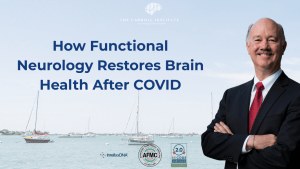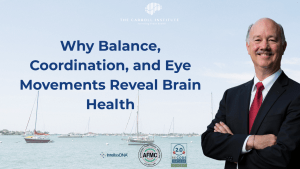Last Updated: October 2025
Every thought, every memory, and every emotion your brain produces depends on energy. That energy comes from tiny structures inside your cells called mitochondria. When mitochondria work properly, they convert nutrients and oxygen into ATP—the brain’s energy currency. However, when they become damaged, energy production drops, inflammation rises, and neurons begin to die. This process, known as mitochondrial dysfunction, is a major contributor to Alzheimer’s disease, Parkinson’s, and other neurodegenerative conditions.
At The Carroll Institute in Sarasota, Dr. Garland Glenn, DC, PhD, AFMC addresses mitochondrial health as a cornerstone of brain recovery. Using The Bredesen ReCODE Protocol and Functional Neurology, he helps patients rebuild energy pathways, restore neuroplasticity, and reverse cognitive decline.
What Are Mitochondria and Why Do They Matter?
Mitochondria are often called the “powerhouses” of cells, but they do much more than make energy. They also regulate inflammation, control cell death, and communicate with the nucleus to maintain cellular repair. When mitochondria are damaged, the brain loses its ability to clear toxins, manage inflammation, or form new neural connections. This creates the perfect storm for neurodegeneration.
Because the brain consumes about 20% of the body’s total energy, even a small decline in mitochondrial performance can have profound effects on focus, memory, and mental endurance.
What Causes Mitochondrial Damage?
Mitochondrial dysfunction rarely happens overnight. Instead, it develops over time due to a combination of environmental, metabolic, and lifestyle factors. Common causes include:
- Heavy metal exposure (mercury, lead, aluminum) that damages mitochondrial enzymes
- Chronic inflammation that disrupts oxygen delivery to cells
- Insulin resistance that deprives neurons of glucose and energy
- Mycotoxin exposure that inhibits ATP production
- Chronic infections like Lyme and EBV that overstimulate the immune system
- Sleep deprivation, nutrient deficiencies, and prolonged stress
Each of these factors chips away at mitochondrial capacity until the brain no longer has enough energy to function properly. The result is cognitive fatigue, poor memory, and sometimes early dementia.
Symptoms of Mitochondrial Dysfunction in the Brain
- Brain fog and poor concentration
- Chronic fatigue and low motivation
- Short-term memory loss
- Muscle weakness or coordination problems
- Increased anxiety or irritability
- Sensitivity to light or sound
Because these symptoms overlap with many other conditions, mitochondrial dysfunction is often overlooked in conventional medicine. Functional Medicine testing helps identify when mitochondrial health is at the core of the problem.
How Functional Medicine Identifies Mitochondrial Dysfunction
At The Carroll Institute, Dr. Glenn uses advanced laboratory testing to evaluate mitochondrial health and identify contributing root causes. Testing may include:
- Organic acids testing (to assess ATP production and oxidative stress)
- Mitochondrial function markers (CoQ10, carnitine, and glutathione levels)
- Inflammatory and oxidative stress markers (CRP, cytokines, F2-isoprostanes)
- Heavy metal and toxin screens
- Nutrient panels for B vitamins, magnesium, and antioxidants
Once testing reveals where the system is breaking down, a personalized mitochondrial repair plan can begin.
Repairing the Brain’s Energy System
Mitochondrial repair requires both removing what’s damaging the cells and supplying the nutrients they need to heal. Dr. Glenn’s protocols typically include:
- Detoxification support: Eliminate heavy metals, mycotoxins, and environmental pollutants.
- Anti-inflammatory nutrition: A low-carb, high-phytonutrient diet rich in omega-3s and antioxidants.
- Energy cofactors: Targeted supplementation with CoQ10, PQQ, L-carnitine, and alpha-lipoic acid.
- Oxygenation and circulation: The Neuronic Photobiomodulation Helmet increases oxygen and ATP in brain tissue.
- Hormone balance: Healthy thyroid, cortisol, and insulin levels are essential for cellular repair.
- Functional Neurology: Cognitive and vestibular exercises to retrain brain pathways weakened by low energy output.
Functional Neurology and Neuroplastic Energy Recovery
Even after mitochondrial damage is addressed biochemically, neurons need retraining. That’s where Functional Neurology comes in. Targeted neurorehabilitation—using eye movement, balance, and coordination exercises—helps restore neural signaling and oxygen utilization. This accelerates the rebuilding of neural pathways, allowing patients to regain clarity, focus, and mental endurance.
ReCODE and the “Metabolic Subtype” of Alzheimer’s
Within The ReCODE Protocol, mitochondrial dysfunction falls under the “metabolic subtype” of cognitive decline. This subtype includes issues like insulin resistance, low nutrient absorption, and mitochondrial decay—all of which are reversible when properly identified and treated. Patients who optimize mitochondrial health often experience measurable improvement in cognitive testing scores within months.
Protecting Your Brain’s Energy System for Life
The brain’s energy system is remarkably resilient. When given the right tools—oxygen, nutrients, and stimulation—it can repair itself, even after years of damage. Mitochondrial healing isn’t just about preventing disease; it’s about reclaiming clarity, focus, and vitality.
If you’re struggling with fatigue, brain fog, or memory loss, book a Discovery Call with The Carroll Institute today. Through personalized Functional Medicine and Functional Neurology care, Dr. Glenn helps patients rebuild their brain’s energy system and restore lasting cognitive health.
Sources
- Rationale for a Multifactorial Approach to Cognitive Decline — NIH (2022)
- Reversal of Cognitive Decline: 100 Patients — ResearchGate (2018)
- Precision Medicine Approach to Alzheimer’s Disease — NIH (2023)
- Mitochondrial Dysfunction and Alzheimer’s Pathogenesis — NIH (2019)
Medically reviewed by Dr. Garland Glenn, DC, PhD, AFMC (Advanced Functional Medicine Clinician)
The Carroll Institute — Sarasota, FL
Learn more about Dr. Glenn’s background and credentials: About Dr. Garland Glenn
This content is for educational purposes only and does not replace personalized medical advice.

Dr. Garland Glenn, DC, PhD, IFM, AFMC
Founder & Clinical Director, The Carroll Institute — Sarasota, FL
Dr. Garland Glenn is a board-certified chiropractic physician and functional medicine practitioner specializing in cognitive health, neurodegeneration, and root-cause medicine. Certified as an AFMC (Advanced Functional Medicine Clinician) and Institute for Functional Medicine (IFM) trained, he has also completed over 500 hours of advanced training in Functional Neurology under Dr. Ted Carrick, founder of the Carrick Institute.
At The Carroll Institute, Dr. Glenn leads Sarasota’s only ReCODE-certified Functional Neurology program, helping patients reverse or prevent cognitive decline through the Bredesen ReCODE Protocol, neuroplasticity exercises, and personalized functional medicine care.
Learn more about his background and approach at About Dr. Garland Glenn.
– schedule now –
free discovery call
To help you get started, we offer a free 20-minute Discovery Phone Consultation. During this call, you will be able to talk with one of our Certified Brain Health Coaches about what going on with you or your loved one and find out if we can help. Please review our FAQs prior to scheduling your free call. We look forward to talking with you soon and helping you Save Your Brain.
(yes, it’s totally free!)
ReCODE® is a registered program developed by Dr. Dale Bredesen and licensed through Apollo Health. Dr. Garland Glenn is a certified ReCODE practitioner.



